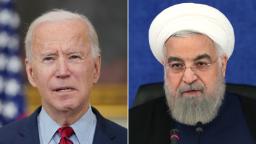[ad_1]

The moderates are also on the clock, facing a harder-line parliament, and a presidential election in months that could impose a tougher approach against the West across government. The material promise of the JCPOA — as the nuclear deal is technically known — needs to loom into view again, and quickly, to raise electoral turnout in their favor.
The Iranians have deftly trod a line between enrichment actions that can terrify if you choose to let them, or be interpreted as symbolic and reversible if you prefer to remain calm. Enriching uranium to 20% purity — as they have done — rings alarm bells, because it is a closer step to the 90% needed for a bomb. But some estimates suggest that even if their 20% pile was enriched to upwards of 90% overnight, it would have enough for less than a handful of bombs. That’s probably not enough of a reward to make a likely Israeli and US attack worth gambling over.
Iran’s production of uranium metal is a necessary step towards bomb-making, critics have said. But they have been making that metal from low-grade uranium, so the step is mostly a show of a technical ability many experts already thought they had. Reports of more and better centrifuges also abound. In short, the Iranians have created a lot of chips to bring to the table — a lot of things they can offer to do first, in exchange for the first softening of US sanctions.
These are, on both sides, serious people, and this is how negotiations go. The central calculation from both parties is as it was six years ago: that Iran would prefer sanctions relief over having the bomb. And that the US would prefer a richer Iran to a nuclear Iran. And that both sides would prefer not to have a war.
You can always get very excited about conflagration in the Middle East, as if it is always just a shot away. Yet wars are complicated, expensive, unpredictable, and tend to require both sides involved wanting or needing them to happen. Both Iran and the US do not want a war right now, palpably, or else they would have used one of the many opportunities over the past months or years to start one. So talks are the likely way forward.
Whatever comes from Vienna’s meeting, it was conjured quickly after months of loud noises, and so is likely to have the foundations for it in place. A western source close to the talks told me there was, at a guess, an “8 out of 10” chance they would lead to further negotiations.
Vienna’s meeting may not lead to a renewed JCPOA this week. It may never lead to the wider “JCPOA Plus” deal Biden wants, to rein in Iran’s missile program and regional influence. It may not rescue Iran’s economy before the presidential elections.
But it is the only real way forward, as both sides knew all along, and it is finally underway.
[ad_2]








